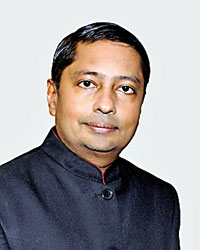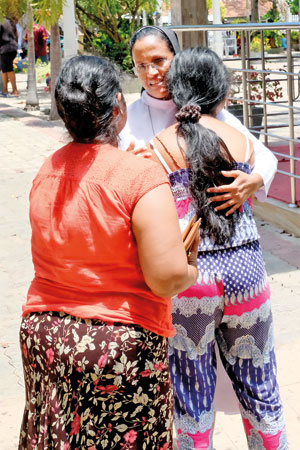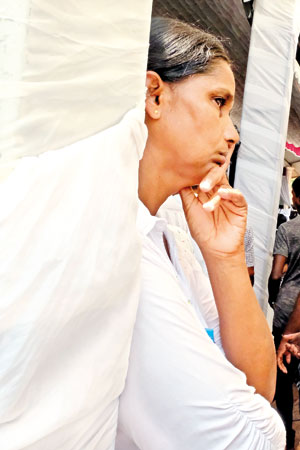News
Trauma vs. stress
A cross the country, someone’s kith and kin are dead in the Easter Sunday bomb blasts that ripped through churches and hotels, while fear and tension still grip the people.
 In the wake of these tragedies, let the bereaved grieve and mourn over their dead. Give them time, before rushing to compel them to undergo counselling, says Consultant Psychiatrist attached to the National Hospital of Sri Lanka, Prof. Raveen Hanwella who is also Chair-Professor of Psychiatry at the Faculty of Medicine, Colombo.
In the wake of these tragedies, let the bereaved grieve and mourn over their dead. Give them time, before rushing to compel them to undergo counselling, says Consultant Psychiatrist attached to the National Hospital of Sri Lanka, Prof. Raveen Hanwella who is also Chair-Professor of Psychiatry at the Faculty of Medicine, Colombo.
Before he delves not only into Post-Traumatic Stress Disorder (PTSD) but also Post-Traumatic Growth, he points out that even though the symptoms of PTSD were highlighted after American soldiers exposed to trauma in the Vietnam War went back home, PTSD had been documented even in soldiers of World War I and II and also ancient times.
Clearly differentiating between ‘trauma’ and ‘stress’, he says that trauma can come about when something beyond the normal day-to-day experience happens to a person. The feelings that arise at the loss of a job, being involved in a minor traffic accident where there is no death or being a party to a divorce are stress rather than trauma.
“Trauma can result from a ‘natural’ disaster such as a landslide, major fire or tsunami or from an ‘unnatural’ or ‘artificial’ disaster such as a man-made bomb blast, arson, death and injury due to the use of firearms or a serious traffic accident,” he says.

Let the bereaved grieve and mourn over their dead. Give them time, before rushing to compel them to undergo counselling. Pix by Amila Gamage
While for people it is easier to accept a natural disaster with the thinking “what to do”, he says that the man-made disaster is more traumatic because there are feelings of it being “unnecessary and unfair”.
There are four main categories of symptoms of PTSD, says Prof. Hanwella. They are: Re-living the trauma in dreams, memories, flashbacks which are like a 3-dimensional reconstruct of the event. Eg. Vietnam veterans in America suddenly shooting at a crowd, without rhyme or reason. This symptom is real but rare, says Prof. Hanwella, adding that in his career as a Psychiatrist he has seen only one or two such patients in Sri Lanka. Avoiding everything linked to the trauma-causing incident. Eg. Some of those who were affected by the Central Bank bombing in Fort by the LTTE not wanting to go back to the area.Emotional numbness where the person cannot feel emotion. There is lack of emotion and there is flatness to life. Being jumpy and sensitive to noise, where even a car backfiring can cause worry. There is hyper arousal as well as being overly alert.
Dealing specifically with the Easter Sunday bomb blasts, Prof. Hanwella reiterates that the “good news” in this kind of tragic situation is that 80% of the people who have been part of it get back to normal without specific therapy, any time between 1-6 months. It is only very rarely that in this 80% there will be a development of delayed PTSD. However, in a minority, the trauma will persist.
With regard to therapies, this Psychiatrist says that some believe that ‘critical incident stress debriefing’ will help as it is good to talk about it and get it out, to normalize life. This is what they did in America – giving ‘compulsory counselling’ en masse, whether people liked it or not after mass shootings etc.
But this has been found to be harmful, warns Prof. Hanwella.
“If you debrief such survivors by force, asking them to tell the events A-Z, they will get re-traumatised and will be worse off than at the beginning. This is not advocated,” he stresses, adding that the need of the hour is “to be there” for them. If they wish to talk you are there and even if they don’t want to talk you are around to support them.
It is normal to be unable to sleep and to feel survivor guilt such as “why am I alive, but my loved one is dead”. But after about a month of the tragedy happening, these feelings reduce, adds Prof. Hanwella.

| Post-Traumatic Growth On a positive note, Prof. Raveen Hanwella talks of those who have had Post-Traumatic Growth after similar, terrible life-changing incidents. Some have become better, reaching great heights as better human beings, he says, explaining that they become more compassionate, energetic and empathetic and also see more meaning in life. Dr. Ajith Perera and Dr. Samitha Samanmali who suffered serious spinal injuries, Dr. Hanwella cites as examples in Sri Lanka. Dr. Perera has become an advocate for people with special needs, while Dr. Samanmali is specializing in rehabilitation to help others. | |
| How to handle children in this situation “They should not be left to their own devices. Even if schools do not open, parents should wake them up at the usual time and get them to stick to their routine by sitting at their lessons and so on. Of course, this must be done, giving paramount importance to their safety,” he says, pointing out that the need is to get over the sense of helplessness that comes about in these situations. |

